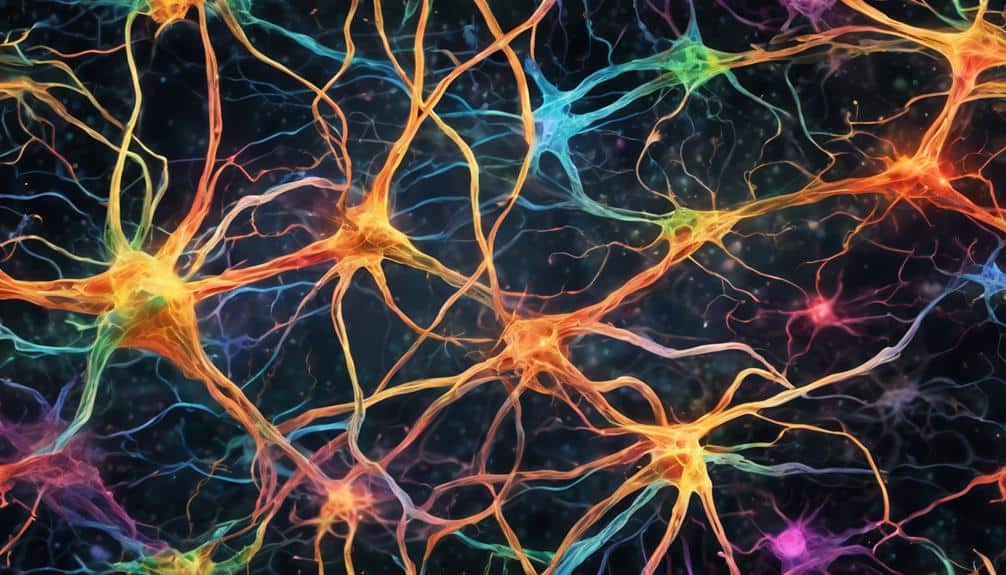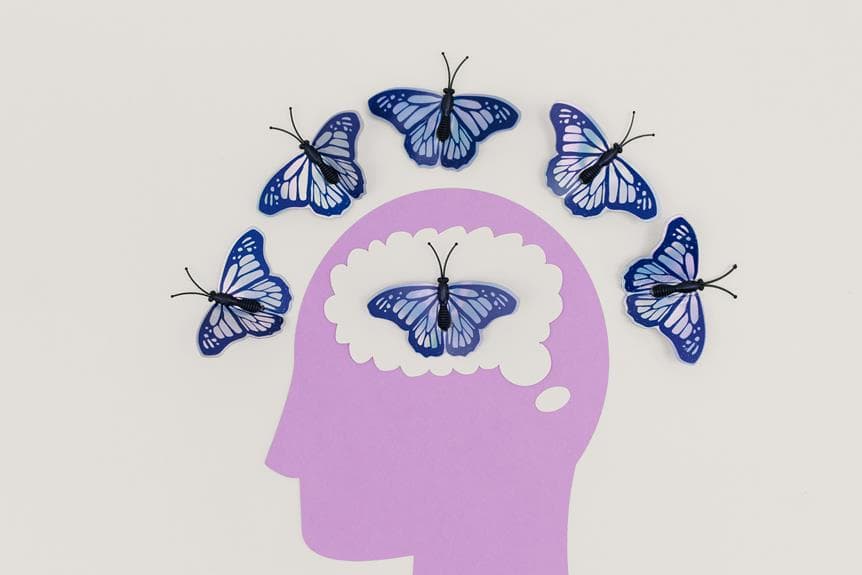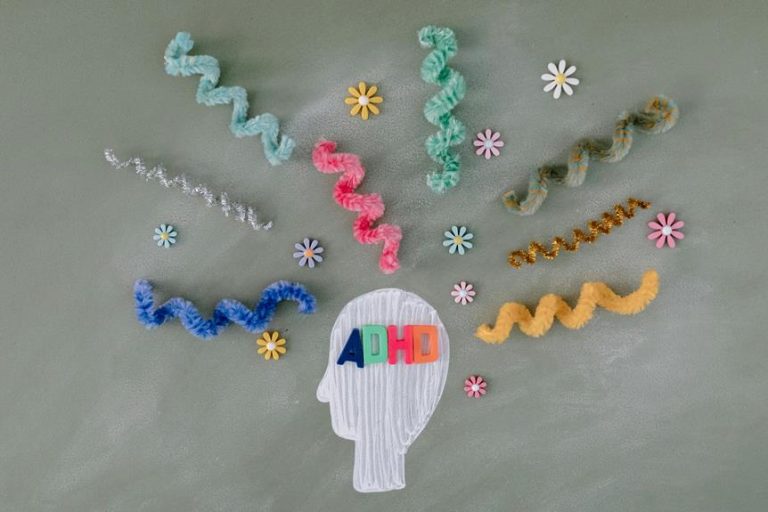My Brain Never Turns off Adhd
Have you ever wondered if it's possible for my brain to never truly switch off, especially with ADHD? The constant buzz of thoughts and ideas swirling around can be exhausting, making it hard to find peace and quiet within.
But what if there are strategies and techniques that could help navigate this perpetual mental activity? Stay tuned to explore ways to calm an overactive mind, manage racing thoughts, and find solace in a world that never seems to stop.
Key Takeaways
- Constant mental activity due to ADHD brain's overactive Default Mode Network
- Challenges in regulating impulses related to movement, speech, and thoughts
- Difficulty pausing or redirecting inner thoughts, leading to impulsive speech
- Incorporating mindfulness, deep breathing, and structured routines for managing ADHD brain
Understanding the ADHD Brain

In traversing the complexities of ADHD, it becomes essential to grasp the intricate workings of the ADHD brain, understanding its constant struggle with regulating impulses related to movement, speech, and thoughts. The ADHD brain, characterized by its overactive Default Mode Network, engages in constant activity, leading to internal battles that manifest in various ways. Overthinking becomes a formidable challenge as the brain finds it hard to pause or redirect this relentless stream of inner thoughts. Focusing on the present moment becomes a challenging task when inundated with impulses and distractions.
Individuals with ADHD often find themselves speaking impulsively, unable to filter their words before they're vocalized. This tendency to blurt out thoughts without inhibition can result in subsequent periods of ruminating on those words, further exacerbating the internal turmoil. The intricate dance between regulating impulses, managing overthinking, and maneuvering inner thoughts underscores the daily struggles faced by those with ADHD.
Strategies for Managing Racing Thoughts

Struggling with racing thoughts can be overwhelming, but there are effective strategies to help manage them and find a sense of calm. For individuals with ADHD, incorporating mindfulness practices can aid in accepting and releasing these thoughts, fostering a more peaceful state of mind. Psychoeducation plays a vital role in increasing awareness and focus, which are key components in managing the constant stream of thoughts that often plague those with ADHD.
Reframing racing thoughts as a sign of an active and creative mind can help reduce the negative emotions associated with them, leading to a more positive outlook.
Additionally, engaging in deep breathing exercises can serve as a valuable tool to redirect focus away from racing thoughts and induce relaxation. Journaling before bedtime offers a structured way to process thoughts, potentially calming a busy mind and facilitating better sleep. By implementing these strategies, individuals with ADHD can work towards managing their racing thoughts and finding moments of peace and clarity in their daily lives.
Techniques for Calming an Overactive Mind

When dealing with an overactive mind, incorporating mindfulness practices can be a powerful way to acknowledge and release the constant stream of thoughts. As someone with ADHD, I understand the struggle of managing racing thoughts and a busy mind. To help calm my overactive mind, I've found the following techniques to be beneficial:
- Practice deep breathing exercises: Redirecting focus away from the chaos of my mind and towards my breath has been a grounding technique.
- Establish a bedtime routine: Engaging in calming activities before bed signals my brain that it's time to relax and wind down.
- Consider journaling: Writing down my thoughts before bed helps me process and organize the racing thoughts that often keep me up at night.
- Seek therapy: Therapy has been instrumental in addressing emotional issues, negative self-talk, and enhancing coping strategies for my busy mind.
Sleep Solutions for ADHD Individuals

How can individuals with ADHD find effective sleep solutions to quiet their racing thoughts and improve their quality of rest?
For those of us with ADHD, establishing a structured bedtime routine is essential. By incorporating calming activities such as meditation, deep breathing, or writing before bed, we can help quiet our racing thoughts and signal to our brains that it's time to unwind.
Creating a sleep-conducive environment with dim lighting, cozy bedding, and a peaceful atmosphere can also promote better sleep quality. It's important to steer clear of stimulants like caffeine close to bedtime and maintain consistent sleep and wake-up routines to support our quest for improved rest.
These strategies can help us navigate the challenges of ADHD and achieve a more structured routine that leads to a more peaceful and restful night's sleep.
Coping Mechanisms for Constant Mental Activity

Living with constant mental activity due to ADHD can be overwhelming, but there are coping mechanisms that can help navigate this challenge.
Engaging in mindfulness practices, like meditation, can provide a moment of calm to acknowledge and release racing thoughts.
Additionally, incorporating deep breathing exercises and establishing a structured bedtime routine can assist in redirecting focus and promoting better sleep patterns.
Mindfulness for ADHD
Practicing mindfulness offers individuals with ADHD a powerful tool to manage their constant mental activity by promoting self-awareness and reducing the impact of distractions on focus and attention. Mindfulness techniques provide a way to observe thoughts and emotions without judgment, fostering a sense of clarity amidst the mental chaos.
Incorporating mindfulness into daily routines can enhance self-regulation and diminish impulsivity, leading to a calmer state of mind. Research indicates that mindfulness practices can induce changes in brain activity, improving executive function and reducing the intensity of racing thoughts common in ADHD.
By embracing mindfulness, individuals with ADHD can cultivate a more focused, attentive, and emotionally regulated mindset.
- Observation of thoughts and emotions without judgment
- Enhancement of self-regulation and reduction of impulsivity
- Improvement in executive function and attention
- Cultivation of a calmer state of mind
Exercise for Focus
Regular physical exercise serves as a valuable coping mechanism for individuals grappling with constant mental activity, offering a pathway to enhance focus and concentration.
Engaging in activities like running, swimming, or cycling can help those with ADHD improve their attention regulation by releasing neurotransmitters such as dopamine and norepinephrine. These neurotransmitters play an important role in boosting cognitive function, memory, and mood, which can alleviate the impact of a constantly active brain.
Additionally, consistent physical activity can also promote better sleep quality, a critical aspect for individuals with ADHD experiencing persistent mental activity.
Healthy Sleep Habits
Constant mental activity often disrupts our ability to achieve restful sleep, making the establishment of healthy sleep habits imperative for managing the challenges of ADHD.
To improve sleep quality, consider these strategies:
- Establish a consistent bedtime routine to signal your brain it's time to wind down.
- Practice relaxation techniques like deep breathing or meditation to quiet the constant mental activity.
- Create a comfortable sleep environment with minimal distractions to promote better rest.
- Limit screen time before bed to avoid interference with your brain's ability to wind down.
Seeking professional guidance or therapy can also provide coping mechanisms tailored to managing constant mental activity for better sleep. By incorporating these habits, individuals with ADHD can work towards achieving a more restful and rejuvenating sleep.
Lifestyle Adjustments to Support ADHD Brain

To best support the ADHD brain, establishing a consistent sleep schedule is essential for regulating brain function and promoting rest. Adequate rest can greatly impact focus, mood, and overall cognitive performance.
Engaging in regular physical exercise is another lifestyle adjustment that can benefit the ADHD brain by supporting neurotransmitter balance and promoting mental relaxation.
Creating a designated workspace with minimal distractions can enhance focus and reduce overstimulation, aiding in productivity and task completion.
In addition, implementing mindfulness practices such as deep breathing or meditation can help calm racing thoughts and improve attention control in individuals with ADHD.
Seeking professional support from ADHD specialists or counselors can provide tailored strategies to manage the challenges of an active ADHD brain effectively. These experts can offer guidance on organizational skills, time management, and behavior modification techniques to optimize daily functioning and enhance overall well-being.
Frequently Asked Questions
Why Does My Brain Never Stop Thinking Adhd?
I can't seem to quiet my mind with ADHD. Constant distractions, racing thoughts, and hyperfocus challenges create an overactive mind. It's exhausting managing persistent worries, uncontrollable thoughts, and endless daydreaming that comes with inner restlessness.
Do People With ADHD Tend to Obsess Over Things?
Yes, people with ADHD can constantly fixate on things. Obsessive thoughts, endless worries, overthinking tendencies – all part of the non-stop analyzing. My brain's relentless concentration leads to intense preoccupation and compulsive pondering.
What Is ADHD Rumination?
ADHD rumination involves constant worrying, overthinking patterns, and intrusive thoughts. It leads to mental exhaustion, endless loops of repetitive questions, and nonstop analyzing. Excessive self-criticism and uncontrollable thoughts contribute to persistent fears, impacting daily life.
How Do You Calm a Racing ADHD Brain?
To calm a racing ADHD brain, I engage in mindfulness techniques like meditation, deep breathing exercises, and yoga. These practices help me manage stress, redirect overwhelming thoughts, and promote relaxation. Establishing a bedtime routine with calming activities also aids in preparing my mind for sleep.
Conclusion
To sum up, managing an overactive ADHD brain requires patience and persistence.
By implementing mindfulness practices, deep breathing exercises, and journaling, individuals can calm their racing thoughts and promote relaxation before bedtime.
Remember, consistency is key in creating a peaceful mind.
Embrace the journey of soothing your restless thoughts, and watch as your brain begins to find balance and tranquility.







